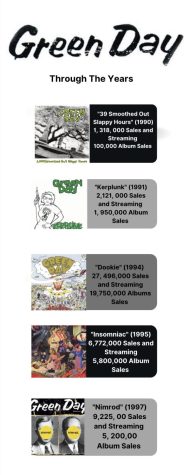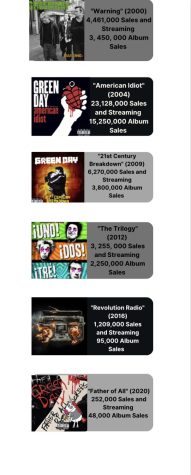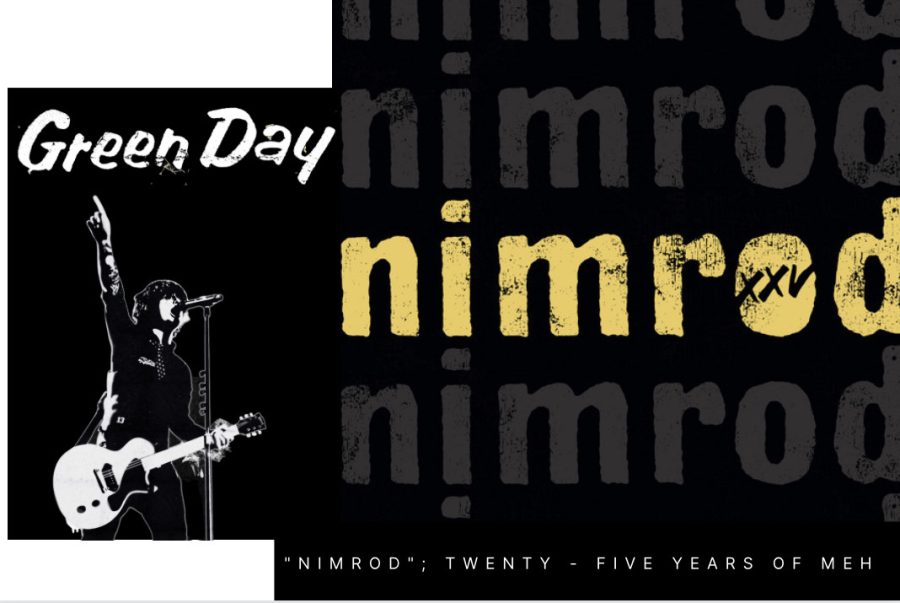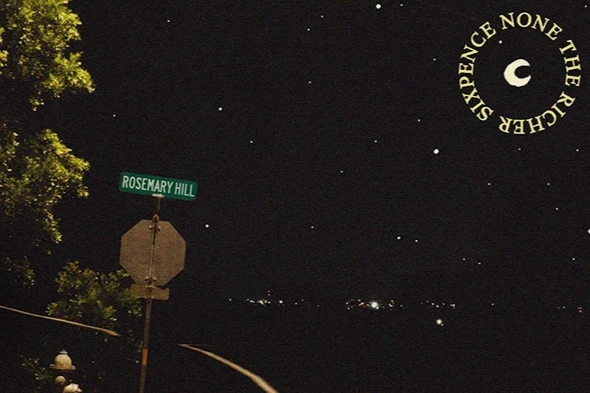Before Green Day took on the U.S. government in 2004 with the iconic album “American Idiot,” they experimented with “Nimrod” in 1997. Whether that was the ska influence of “King for a Day” or the hardcore punk of “Take Back,” this album showed Green Day was open to experimenting with a more acoustic sound. “Nimrod” reflected on the band’s long fight with addiction, exposed love and heartbreak, and reflected on the overnight stardom they reached from their earlier albums “Dookie” and the snotty “Insomniac.”
Now 25 years later, Green Day has rereleased “Nimrod” with the same 18 songs released in 1997. In addition, they dropped 14 never-before-released demos and 19 recordings of live performances from their Philadelphia Electric Factory concert, captured on Nov. 14, 1997. The limited-edition silver vinyl version of “Nimrod XXV” is exclusively available in the official Green Day store and indie record stores, with pricing going at $125 for the box set. The box set includes 3 albums on 5 silver vinyl LPs, a 20-page 12” x 12” book, poster, cloth patch, exclusive slip-mat, and commemorative backstage pass.

As a huge Green Day and punk fan, I was excited when I heard Green Day was releasing something new since the poorly received 2020 album “Father of All”: an album that almost completely erased the iconic Green Day sound and left fans and critics annoyed. With only 252 thousand record sales worldwide, fans argued that “Father of All” was Green Day’s poor attempt to stay relevant. Rumor has it that Green Day only made the 26- record of getting out of their vigorous and problematic record label and contract with Reprise/Warner Bros Records.
Like “Father of All,” “Nimrod” only had a few songs that stuck with me; the rest easily are forgettable. Punk is known to be fast-paced and not to hold back in emotion. While “Nimrod” doesn’t hold back with emotion, the album ends at 49 minutes. It may not seem long, but most songs blend with the same tedious rhythm. “All The Time” and “Worry Rock” are back-to-back tracks, “Worry Rock” follows behind “All The Time” with the same guitar strumming pattern, just tuned a half step down. Neither are bad songs. It’s just overused, stiff and boring.
Some of the live songs on the album are “Basket Case,” “Brain Stew,” and “When I Come Around.” I don’t like “Basket Case” or “When I Come Around” just because they’re so overplayed. “Basket Case” releases Armstrong’s struggle with anxiety, and “When I Come Around” looks at the trial and error of a callow relationship. Although both songs have a darker meaning behind them, that is masked by the light sound released from the catchy rhythm. “Brain Stew” is just a simple, repeating chord pattern that can sometimes be annoying: it doesn’t let any light or charisma shine through. The lyrics detail Armstrong’s struggle with insomnia and substance abuse.
Similar to the darker tone from “Insomniacs” debut single “Brain Stew,” the debut single from “Nimrod” is an unexpected, fast punk beat harmonized with intense guitar tones and a gnarly scream from Billie Joe Armstrong as he sings about falling off the wagon back into addiction. Another one that comes to mind immediately is “Good Riddance (Time of Your Life),” A stripped-down ballad with repetitive, melancholic — but sarcastic — lyrics written by Billie Joe Armstrong, duetted with an acoustic guitar and a backing orchestra. This song is not happy; the ‘I wish you the best’ song is the exact opposite. Armstrong wrote it about his then-girlfriend who left him to move to Ecuador. He wrote it as a petty send-off. Stop playing it at weddings or graduations. “Good Riddance (Time of Your Life)” isn’t a bad song; it was good the first eight-hundred times I heard it. It’s a creative acoustic ballad that could very well be one of Green Day’s defining songs; it’s so overplayed and played in the most ironic places that it earns an instant eye roll from me.

Some fans argue “Nimrod“ has Armstrong’s best writing. Debatable. “Nimrod“ definitely has some memorable lyrics like “I love you is not enough, I’m lost for words” off of “Redundant” or even the sudden realization of “Oh my god, I’m turning out just like my Dad” off of “The Grouch.” These prove why Armstrong is known for his writing, even if it’s more sarcastic than melancholic. However, some flaws in his lyricism are apparent in “Nimrod.” The quick change of tone in his writing makes the album not flow as easily as other albums. “Nimrod“’s “King For a Day” is adored by many fans. It’s a fun song that brings out Armstrong’s feminine side, but the lyric, “Who put the drag in the drag queen? Don’t knock it until you’ve tried it,” is funky. Drag queens are great and entertaining, but “King for a Day” feels out of place on “Nimrod.” Don’t get me wrong, I love that Armstrong is very open with his feminine side and isn’t afraid to express it, but just a song earlier, he writes, “You pushed me once too far again. I’d like to break your teeth,” in the irritated punk classic “Take Back.” In no way do they complement each other, and hearing them right next to each other while listening to the full album makes you do a double take.
A more appropriate way to look at his writing on “Nimrod” was that it was much more adult than his previous work. Peaking thirty and being a father, husband, and recovering addict, Armstrong wanted to write more adult songs. He accomplished that well, but to say “Nimrod” is his best writing is an overstatement.
Despite its flaws, Armstrong’s sarcastic lyrics helped form his iconic bitter and congested voice, which was easy to hear on the demos added to “Nimrod XXV” With these demos, it was enjoyable to hear the raw snot and emotion come out of Armstrong’s voice simply dueted with a guitar. Armstrong shines with “Black Eyeliner,” – a demo of a song that took on the challenge of love and Armstrong’s insomnia. Also, a fun easter egg for longtime fans is included since he mentions wearing eyeliner in the song; yet he wasn’t known for his now-famous eyes until the release of “American Idiot” in 2004.
Furthermore, Green Day has been known to have some of the most mesmerizing and memorable live shows for decades. Whether it’s the infamous mud fight at Woodstock 94’ or pulling a kid on stage to play guitar in front of thousands of people: Green Day knows how to put on a show. With that, the live performances on “Nimrod XXV” were some of the best of the band’s time. Each chord, note, run, and even scream were on point. The often side conversations between Armstrong and bassist Mike Dirnt often caused large laughter from the crowd. With humor, there was still emotion in the performances. The anticipated scream Armstrong pulls during “Hitchin’ a Ride” easily makes it one of the best performances on the album. The rasp and power of the scream easily let the listener embrace the pain and anger Armstrong captivated while performing. With every power chord hit on Armstrong’s guitar, you could hear the anger or sadness come out of him effortlessly. Something that translated through the rerelease of “Nimrod” better than the original.
Overall, “Nimrod” isn’t the Green Day album for me. Personally, it’s not as good as people say it is. It’s not Billie Joe Armstrong’s best writing, and it isn’t their most creative album. Green Day was trying to step away from the dangerous punk lifestyle they had been accustomed to and to grow up in this album. Spoiler alert: They haven’t. They’re still loudmouth, petulant punks. With the new demos and live tracks released, it made the album more interesting. That said, it’s still much more forgettable than some of the band’s other albums.
The Pathfinder gives “Nimrod XXV” a 6.5/10





![There are more than 20 open cardio machines at Crunch Fitness. I enjoyed the spacious environment at Crunch, a sentiment that was shared by sophomore Sanjana Daggubati. “[Going to] Crunch Fitness was the right decision because [it] feels more professional. Crunch’s workers are laid back, but not to the point where they don't care,” Daggubati said.](https://pwestpathfinder.com/wp-content/uploads/2025/09/IMG_5242-1-1200x900.jpg)

![Various empty Kit Kat wrappers crowd the desk, surrounded by scoring sheets. While production of Kit Kat flavors in the U.S. is limited, Nestlé, the owner of Kit Kat, manufactures hundreds of unique flavors in Japan, including the flavors ocean salt and passion fruit. “I thought there [were] some interesting flavors, and a lot of them were really unexpected,” senior Elle Levesque said.](https://pwestpathfinder.com/wp-content/uploads/2025/09/image-2.png)


![Pantone’s selection of the 2025 Color of the Year is revealed: Mocha Mousse. Ceramics teacher Ashley Drissell enjoys this year’s selection. “Maybe it’s the name but [Mocha Mousse] reminds me of chocolate and coffee. It makes me hungry. It’s very rich and decadent,” Drissell said.](https://pwestpathfinder.com/wp-content/uploads/2025/02/DSC_0015-1200x800.jpg)



Serena • Apr 19, 2023 at 10:39 am
Great story Mikalah!!!